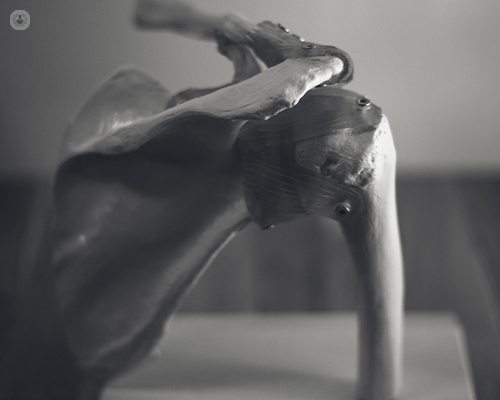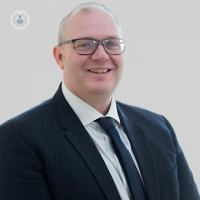I have stiff shoulder, now what?
Written by:You’re experiencing a stiff shoulder and you know what is causing it, but now what do you do to relieve it? Following his first article, highly experienced consultant orthopaedic surgeon Mr Alun Yewlett now provides advice about what to do if you have stiff shoulder.

Is it a good idea to try to "crack" my stiff shoulder with exercise?
It’s one of those questions that there’s a yes and no answer, depending on every patient. I will generally say that for any shoulder that is stiff and sore, movement is always something helpful to try and do. There is a certain element the user will move it, so if we don’t use our shoulders, you get into a vicious loop of not doing it and that stiffness becomes worse.
Cracking a joint depends really on what you mean by “cracking” a joint. If you are younger, quite often you will have clicks from the shoulder when making an “8” motion, but that’s not the same. That’s the one thing associated with people who are actually paradoxical, who are slightly unstable rather than stiff.
The only good thing about getting older is that we don’t tend to become unstable as we get stiffer. In those groups I’d say that yes, there’s no problem trying to move the shoulder with the occasional click or crack. But if you are known to have underlying arthritis and you hear a very loud crack and you get some pain, it’s probably worth going to see a physician if you have not already. It may be that you’ve got an underlying arthritic change in your shoulder and you may need to consider having something done.
When should you see a doctor?
We know that most shoulder complaints are usually self-limiting; they will usually settle in the first four to six weeks on their own, specifically in the absence of a serious trauma. Simple self-help measures are very useful: if you can take inflammatory medication, moving the shoulder, seeing a physiotherapist, and keeping the shoulder warm and supple is very helpful. I would generally say that the main driver to seek attention from health services for most patients is actually the fact that the intensity is very debilitating at night and it will really affect their sleep.
If you get to the stage where you’ve got persistent pain in the shoulder, it hasn’t settled down on its own after simple measures, such as physiotherapy, in four to six weeks and sleep is disturbed, I think it’s worth getting an opinion. On occasion, if the pain is very severe from a specific traumatic accident, then clearly go seek attention sooner than that.
How is a stiff shoulder treated?
As with all conditions, how you treat it depends on the diagnosis. In broad terms, if the stiff shoulder was due to frozen shoulder, most of the treatment issues will be physiotherapy or injection therapy with a steroid (although there are issues with that at the moment because of the COVID pandemic, and I strongly suggest patients are double vaccinated). In some cases, you need to do what is called a manipulation under anaesthesia and a capsule release, which is a surgical intervention procedure to release the scar tissue.
Other frozen shoulders with arthritis that can be treated, as we talked about previously, is if it’s not settled down with simple treatments and physiotherapy, injection therapies, then there is an option to treat it with shoulder replacements in such situations. And that is a conversation you should have with a specialist who has an interest in it.
If you are experiencing a stiff shoulder or you would like more information, you can go to Mr Yewlett's profile and schedule a consultation.


